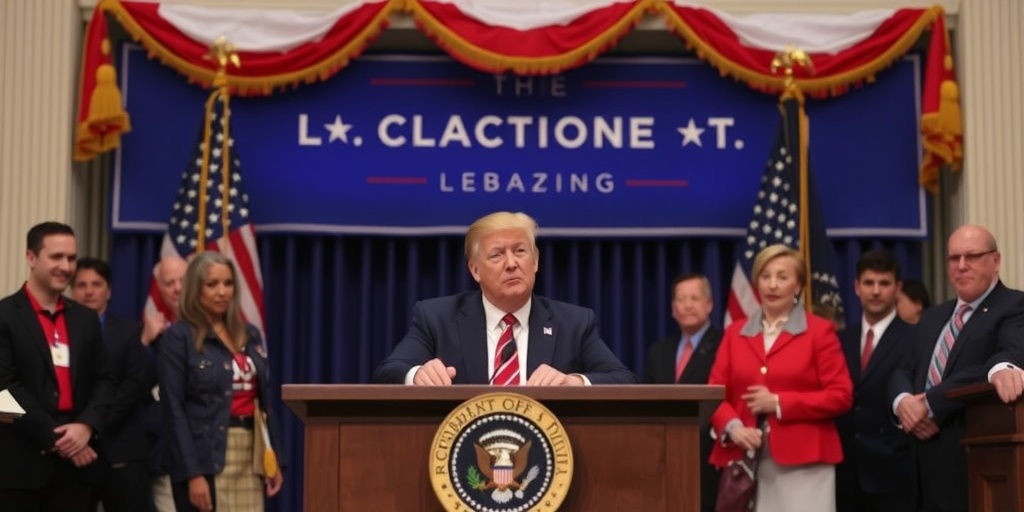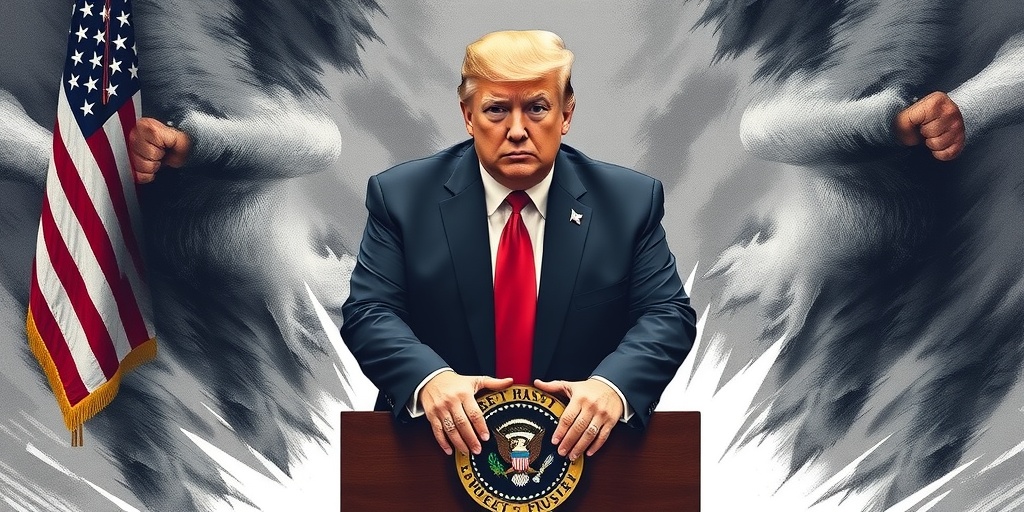Now Reading: Trump’s Order on Federal Unions Could Undermine Groups Opposing DOGE Cuts
-
01
Trump’s Order on Federal Unions Could Undermine Groups Opposing DOGE Cuts
Trump’s Order on Federal Unions Could Undermine Groups Opposing DOGE Cuts

Federal Worker Unions Unite Against New Executive Order Targeting Labor Rights
In recent weeks, federal worker unions have ramped up their efforts to resist the measures implemented by President Trump and his Department of Government Efficiency, which has culminated in a series of lawsuits, organized protests, and a surge in new union membership. The situation took a dramatic turn this week as President Trump issued a sweeping executive order perceived as a major offense against labor rights.
Labeling federal unions as “hostile” to his governmental agenda, President Trump cited national security concerns as justification for removing approximately one million civil servants from union protections across more than a dozen federal agencies. This drastic measure essentially strips unions of their power to represent these workers in negotiations and legal proceedings, raising alarms among labor leaders and advocates.
Accompanying the executive order, the Trump administration has filed a lawsuit in federal court in Texas requesting judicial approval to revoke existing collective bargaining agreements. The administration argues that these agreements have hindered executive power, an assertion that labor leaders contest vehemently.
Brian Kelly, a Michigan-based Environmental Protection Agency employee who leads a local chapter of the American Federation of Government Employees (AFGE), emphasized the dire implications of the executive order. "They are hobbling the union, ripping up collective bargaining agreements, and then they will come for the workers," he stated, calling it a "worst-case scenario."
The executive order is part of a broader strategy by the Trump administration to undermine perceived adversaries, particularly those representing civil servants that the president has labeled as part of the “deep state.” In his directive, Trump has expanded the exemption from collective bargaining to include a range of agencies, including the Departments of Veterans Affairs, Treasury, and Energy, as well as significant portions of Health and Human Services. Previously, employees of the FBI and CIA were already excluded from such bargaining, but this new order broadens the scope considerably.
A White House spokesperson, Harrison Fields, reiterated that the purpose of the order is to prevent employees in critical security sectors from unionizing in ways that could pose a threat to the president’s agenda. Critics argue that the intent is to weaken unions that have historically served as a bulwark against executive overreach.
Despite the administration’s position, labor advocates are mounting a robust legal counter-offensive. Experts, such as Samuel R. Bagenstos, a law professor at the University of Michigan and a former legal counsel to the Department of Health and Human Services, warn that the executive order may be legally vulnerable. Bagenstos describes it as “a dramatic overreach of the president’s authority under federal workforce regulations,” suggesting that attempts to justify this move under national security laws are largely implausible.
Unions express grave concerns about the immediate ramifications of the executive order. The cancellation of collective bargaining agreements could significantly hamper their ability to collect dues from members, with around 75% of AFGE’s 300,000 dues-paying members relying on automatic paycheck deductions. Labor leaders recognize that they now face the daunting task of convincing members to transition to direct payments.
Moreover, the unions fear that the order could undermine their capacity to seek recourse through the federal court system. Without collective bargaining agreements, they may lose their legal standing to represent workers in lawsuits, effectively silencing their voices in judicial processes. As confirmed by White House spokesperson Fields, unions affected by the order would no longer be able to advocate for agency employees.
Union leaders have pledged to fight back against what they view as a direct assault on workers’ rights and collective bargaining. Everett Kelley, president of the AFGE, voiced strong opposition to the executive order, claiming it is "plainly retaliatory." He emphasized that the labor movement would not be silenced. Similarly, Randy Erwin, president of the National Federation of Federal Employees, labeled the order as the most significant erosion of collective bargaining rights in history, arguing that it is both “blatantly illegal and unconstitutional.”
The tumultuous environment for federal employees is only heightened by ongoing workforce reduction measures initiated by the Trump administration as it seeks to streamline operations. The AFGE has witnessed a remarkable increase in membership since Trump’s return to office, indicating a renewed vigor among workers seeking to protect their rights and livelihoods.
Moving forward, union leaders emphasize the need for an active dialogue not only with federal workers but with the broader American public. Kelly remarked on the urgency of communicating the risks posed by the executive order, stating, “You need people to really see how dangerous this is.” As federal labor unions prepare for a challenging battle ahead, their unity and resolve will be tested in the face of overwhelming governmental pressure.
Stay Informed With the Latest & Most Important News
Previous Post
Next Post
-
 01New technology breakthrough has everyone talking right now
01New technology breakthrough has everyone talking right now -
 02Unbelievable life hack everyone needs to try today
02Unbelievable life hack everyone needs to try today -
 03Fascinating discovery found buried deep beneath the ocean
03Fascinating discovery found buried deep beneath the ocean -
 04Man invents genius device that solves everyday problems
04Man invents genius device that solves everyday problems -
 05Shocking discovery that changes what we know forever
05Shocking discovery that changes what we know forever -
 06Internet goes wild over celebrity’s unexpected fashion choice
06Internet goes wild over celebrity’s unexpected fashion choice -
 07Rare animal sighting stuns scientists and wildlife lovers
07Rare animal sighting stuns scientists and wildlife lovers





















